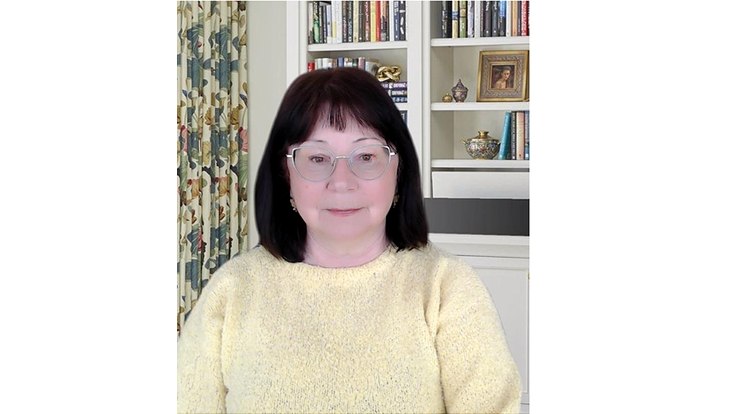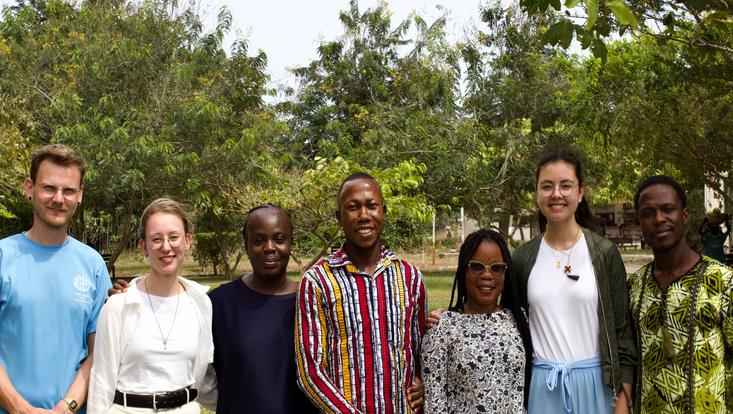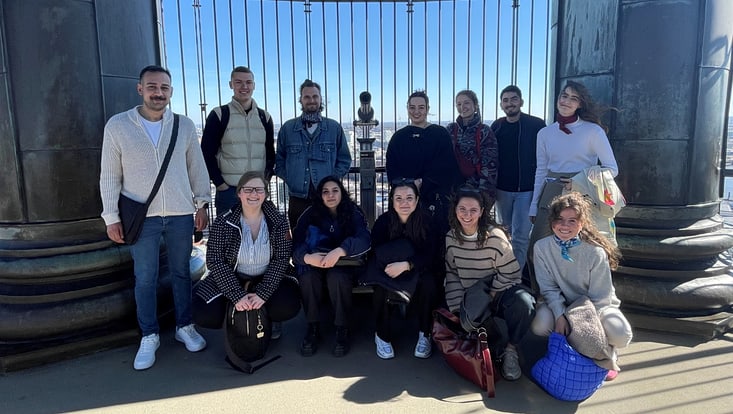"But most importantly, today we use these languages differently from how we used them in the past."Ein Interview mit Larissa Aronin
30. Mai 2024

Foto: Larissa Aronin
Wir sprachen mit Larissa Aronin - eine DAAD Gastdozentin an der Fakultät für Erziehungswissenschaft. Sie ist in Israel ansässig. Prof. Aronin gehörte zu den Gründungsmitgliedern der International Association of Multilingualism und war zwei Semester lang Sekretärin der IAM. Sie gilt als führende Wissenschaftlerin auf dem Gebiet der Mehrsprachigkeit, die das Konzept der New Linguistic Dispensation entwickelt hat und internationale Forschungsarbeiten über "Dominant Language Constellations" und "Material Culture of Multilingualism" leitet. Zu ihren Veröffentlichungen gehören Monographien und Lehrbücher über Mehrsprachigkeit; sie ist Herausgeberin einer Reihe von Bänden über Dominant Constellations. Zu ihren Interessensgebieten gehören auch das Lehren und Lernen mehrerer Sprachen, Identität, interkulturelle und multikulturelle Studien und Diversität, Komplexität und Sprachkontakt sowie die Philosophie der Mehrsprachigkeit
You have just arrived in Hamburg. What is your impression of the city?
I am for the first time in Hamburg and managed to see only some glimpses of it. The Free and Hanseatic city filled with a rich historical past and bustling present fascinates and inspires. With that, unlike other big metropolises, it feels hasteless, and pleasant to live in. I like the green parks, the harbour and lakes, the grand architecture, the friendly people, and even the weather is favourable and sunny so far. I am happy I have a few months at my disposal to explore this unique city in more detail.
What is your research focus and what is its connection with our Faculty of Education?
My overarching interest is multilingualism; it is about learning, teaching, and using languages. You see, today, most of the world's population is bilingual and multilingual. The number of languages that are used and recognized increased drastically. But most importantly, today we use these languages differently from how we used them in the past. Instead of the habitual use of a single language that was normally enough for communication, education, and work, people now use clusters of languages, that together help them to perform all the essential functions of communication cognition and identity. These clusters of languages are the units of linguistic circulation in today’s world; they are called Dominant Language Constellations (DLC). Along with my international colleagues from Australia, Austria, Poland, Sweden, and other countries we develop the DLC approach for social use and education. I am especially glad to be here at the University of Hamburg because it is here where we have a most productive and promising collaboration on DLC in educational settings with Prof. Silvia Melo-Pfeifer. Her Ph.D. students Lisa Marie Brinkmann and Franziska Gerwers also work on the topic and successfully published book chapters and gave presentations at conferences. In 2023, together with Silvia Melo-Pfeifer we have published a co-edited volume on DLC and identity.
Another direction of collaboration with the researchers of the Faculty of Education is the material culture of multilingualism. It is a fascinating area of research, cross-cutting with sociology, ethnology, psychology, cultural studies, and art-based approaches in education. We call it “the material culture of multilingualism”. This addition ‘of multilingualism’ points to the focus on multilingual and multicultural settings. Our work is not only theoretical, but is directed at school practices and teaching methods for the benefit of multilingual pupils and teachers. The material culture area of interest is still in its infancy. The more challenging it is for us to unfold its potential and be the pioneers in research. In the scope of my activities in Hamburg, a three-day-long online workshop on the material culture of multilingualism with our international colleagues is planned for June. A co-edited volume on this topic is at work.
So, you can see that my research is multidisciplinary. It cannot be otherwise in contemporary research and education. Teaching multiple languages involves not only linguistics and intercultural and diversity studies but also includes a variety of approaches that are used in other areas of human knowledge. In my research, I often employ the complexity perspective and recently started cooperation with the information technology specialists.
What research and teaching activities do you foresee during your stay in Hamburg?
I teach seminars on the MA, BA, and Ph.D levels all connected to multilingualism, education, and art-based research and teaching methods. This is an immensely rewarding activity and unforgettable communication with the students. They have already taught me a lot.
I am looking forward to meeting the colleagues at the faculty. Some of them I never met, but have been following their work. Their research interests coincide with mine in many respects. With other colleagues from the Faculty of Education I already have productive cooperation and being here in Hamburg presents a wonderful opportunity to work together face-to-face. In such a stimulating setting, discussions and mutual enrichment spark new ideas. I am ‘taken’ by the art-based teaching methods and research that are developed by Sílvia Melo-Pfeifer. On the other hand, Sílvia shares my research interests. Together, we are working on the DLC approach. In terms of practical outcomes, we made a workshop for teachers at the Marion Dönhoff Gymnasium in Hamburg in collaboration with Dr. Julia von Rosen. The title was “What are dominant language constellations and how can I use them in the language classroom? - a hands-on approach”: teachers shared their linguistic biographies and the multilingual pedagogies and strategies they use in the classroom and we reflected on how Dominant Language Constellations can be used to grasp the diversity of students’ linguistic trajectories, or “multilingualism as lived”.
I feel honored to be invited to participate in the activities of the LIDS research group, take part in the MARE conference organized by Dr. Irina Usanova, and give several guest lectures on languages at work, situations of linguistic contact, DLC, and the use of material culture of multilingualism.
I enjoy the working atmosphere in the department. The open and constructive discussions between students and professors, in largely international teams provide unique collaboration possibilities. Last but not least, during my stay in Hamburg, I feel very comfortable thanks to the supportive colleagues, and the guidance and support on the part of Welcome Service, the International Office, Andrea Krepp, and Hélène Gaudet.
For further information on the Dominant Language Constellations, please visit this site (site dedicated to DLC https://www.dominant-language-constellations.com/).
For further information on Larissa Aronin, please visit the site: https://larissa-aronin.com/ and see the encyclopedia entry, and the Festschrift volume:
Ó Laoire, Muiris (in print) Larissa Aronin. In Carol A. Chapelle (ed.). The Encyclopedia of Applied Linguistics Second edition (pp. tba). Wiley-Blackwell.
and the volume
Danuta Gabryś-Barker, Eva Vetter (eds.) 2024 Modern Approaches to Researching Multilingualism. Studies in Honour of Larissa Aronin. Springer Nature Switzerland


